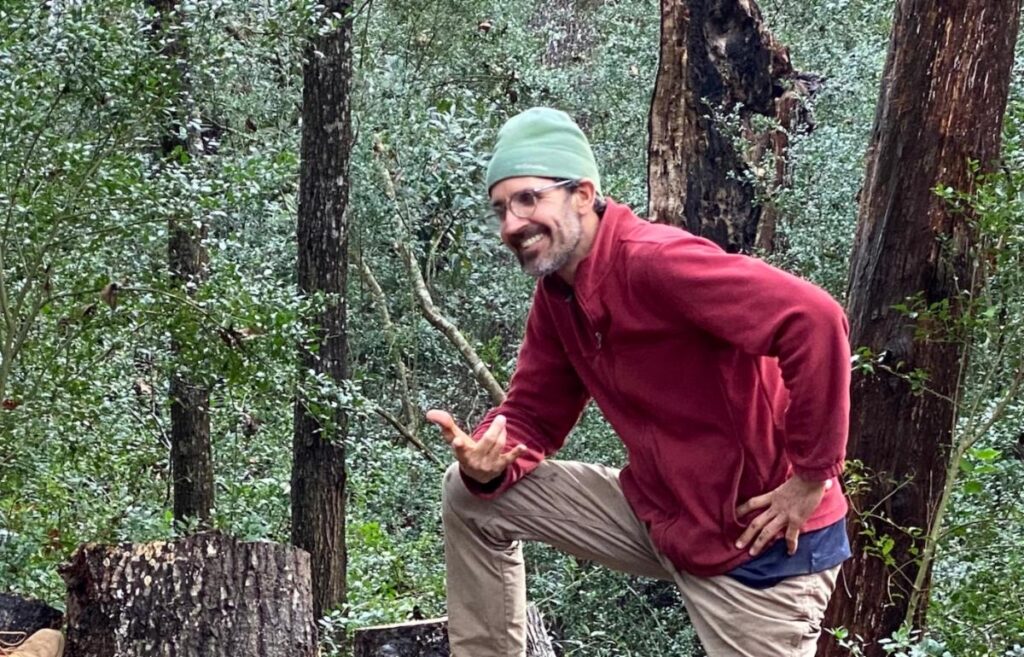
March 26, 2021
Growing at the Center
For more than twenty years, Bryan West has been carefully tending to the grounds of Baba’s home in the West, and Meher Baba has been carefully tending to Bryan West.
Bryan’s relationship with Baba began a few years before he first came to the Center.* As a recent high school graduate in San Diego, Bryan moved in with Scott and Anne Makeig and their kids, a family he had always felt was special—something about their warmth, their mutual respect, the healthy way they were together. He knew they were devoted to a guru, Meher Baba, but didn’t yet know the role Baba would play in his own life.
Then one tumultuous night, Bryan set off on a walk to clear his head. He ended up at the edge of the ocean and decided to go wading—but was pushed and pulled deeper than he intended. As the waves dragged him toward some pilings, he struggled and narrowly escaped what could have been a fatal accident. Shaken and exhausted on the shore, he didn’t know what to do when he heard a voice: “Just go home, be safe. Get into bed and take it easy.”
That was Bryan’s first feeling of connection with Baba: a simple, gentle, practical voice of love from deep within him.
It wasn’t until a few years later that Bryan considered working on the Center. He was at an important crossroads, about to finish college, wrenchingly unclear about his next move. Suddenly, Scott Makeig suggested, “Why don’t you go and work at the Center for a little while? Just until you get things figured out.”
Bryan balked at first—the beachwear shops and neon crab signs weren’t an immediate draw—but he couldn’t shake that voice, and soon he found himself driving east. He had no plans to stay at the Center long; in fact, he remembers thinking to himself, “I just need to rake my life out a little bit.”
Bryan was provided with an apartment in the home of a long-time Baba lover, Virginia Rudd, who took him in, cooked meals for him, talked with him endlessly about mutual literary interests and, of course, about Baba. Soon Bryan started working on the Center, and one of his first jobs was raking the compound at Baba’s house.
Bryan found the outside work beautiful, healthy, poetic, just what he needed. He kept learning and gaining more responsibility, caring for the natural beauty of Baba’s home as the time went by: first months, then years, and now decades.
Throughout, Bryan has felt Baba’s presence in the people around him. This initially included many lovers who had been with Baba in the body, the quiet luminosity of remembering Him with them. And then it was simply the constant arrival of God through the guests, year after year, and daily companionship with his fellow workers.
Bryan has also been shaped by the inevitable grumbles and clashes of community. He has become less battered by his own emotions over time, less likely to keep “bashing my head against a wall,” more able to let things go. Bryan says of the increased detachment he’s gradually seen in himself, “I would say He likes that kind of happiness too.”
Now, after more than twenty years, Bryan seems to know every tree on the Center, and to constantly, discerningly rustle through every bush. The vistas onto the shimmering lake have been carefully tended by him, as have the trees that adorn the entrances of the special buildings, the paths that Baba’s lovers walk contemplating God. Bryan says that the meaning of the quote “work is worship” becomes ever clearer to him: that legacy dating back to the very beginning, to Elizabeth and Norina carefully and painstakingly and lovingly creating Baba’s home in the first place.
And so Bryan continues to grow at Meher Center, tending and being tended, turning his face more and more to the Sun.
*Stories from personal communication and Bryan’s chapter in the book Waves and Waves of Love, Compiled and Edited by Carolyn M. Ball